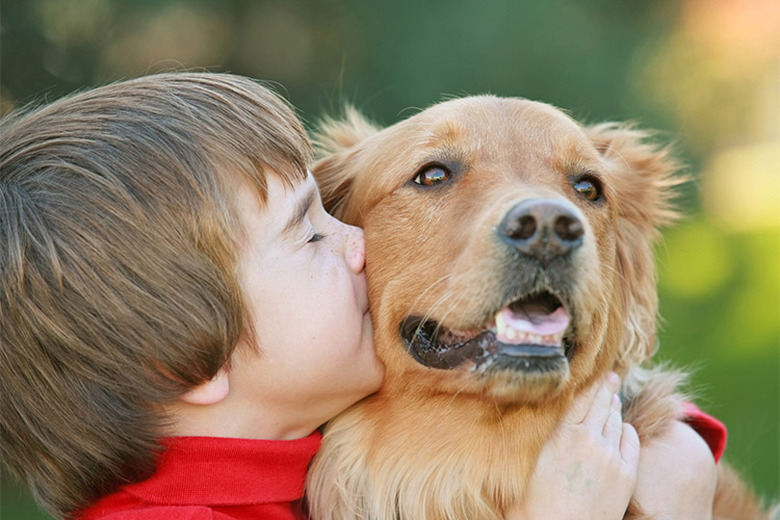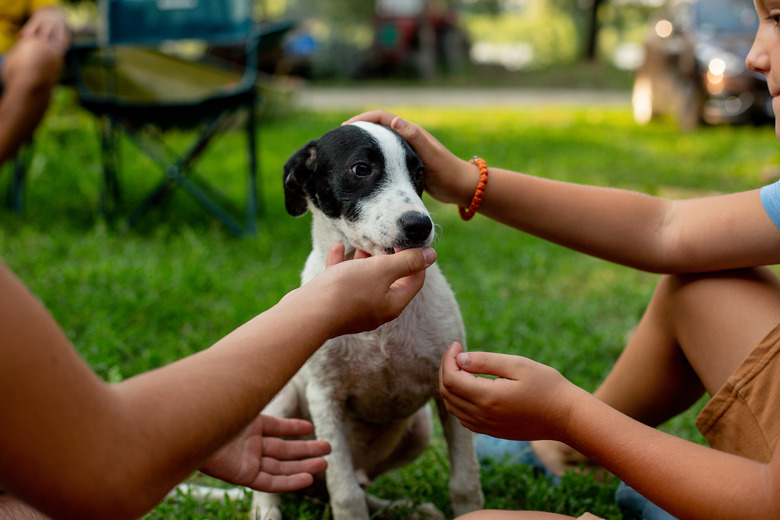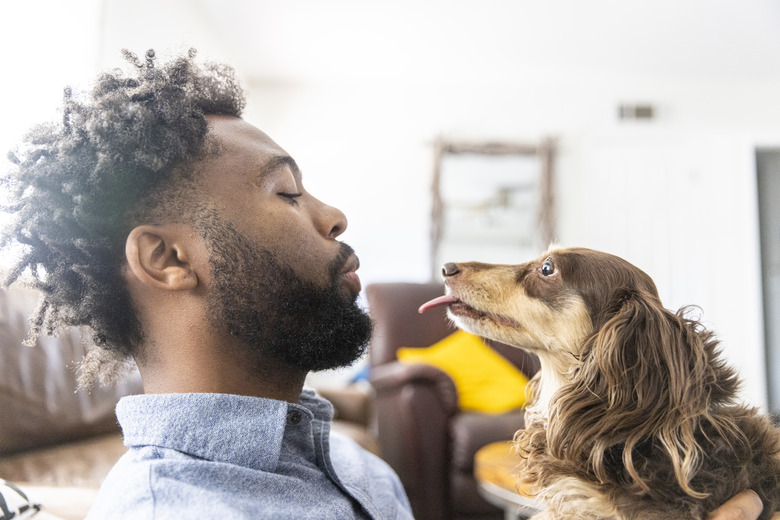Do Dogs Like Hugs And Kisses?
Humans are hardwired to want — make that need — hugging, kissing, and other forms of physical affection. Developmental psychology clearly shows that when most mammals, including humans, are deprived of physical affection, they develop emotional and physical problems. It might be tempting to extend that same belief to mammals in the form of dogs, but research actually shows that dogs don't like hugs — at least not in the way that we are used to.
Why don't dogs like hugs? It's not that they don't want or like the physical affection they get from us. The real issue seems to be that they prefer to receive physical affection in forms other than hugs.
Do animals hug each other?
Do animals hug each other?
The research on humans and physical touch is clear, as the London Journal of Primary Care summarized in a 2016 paper: A lack of physical affection as an infant and young child or inconsistent physical affection leads to a lack of language and emotional development. When humans hug, it releases the "feel good" hormone oxytocin in the brain, which helps us feel bonded to one another.
Lots of animals hug each other. Animals can only hug if they have arms, and for the most part, that means primates like us. It's common to see infant bonobos, which are peaceful primates, walking around hugging each other. Bonobos even ask for hugs. Monkeys like macaques and orangutans hug and even kiss. In animals without arms, physical affection is usually relegated to grooming, such as fur licking, or gentle rubs with paws or heads, such as what a cat will do.
Dogs are similar. They show affection through eye contact, nuzzling with their nose, licking, rubbing against each other and their humans, and offering protection.
Hugs and dogs
Hugs and dogs
Stanley Coren, a Ph.D. psychologist who has researched and written several books about dogs and who writes the "Canine Corner" column for Psychology Today, studied photos posted online of humans hugging their dogs. He studied hundreds of photos of humans hugging dogs to try to answer questions like "do dogs like it when you hug them?" Unfortunately, dogs don't seem to like hugs. He looked for signs of stress in dogs in the photos. These signs include:
- The dog baring his teeth
- The dog turning his head away
- Partially closing the eyes
- Showing "half-moon eye" or "whale eye" (which is where you can see the white portion of the eyes at the corner or the rim)
- Lowered or slicked-back ears
- Lip licking
- Licking a person's face
- Yawning
- Raising one paw
Coren concluded that 81.6 percent of the photographs studied by researchers showed at least one sign of discomfort, stress, or anxiety. Only 7.6 percent of the photographs showed dogs that seemed to like being hugged. The remaining 10.8 percent of the dogs were either neutral or ambiguous in their responses to the hugs and affection. The bottom line is that some dogs like to be touched, or "handled" in official terms, but some don't.
If you are approaching an unfamiliar dog or you aren't sure if the dog is in the mood to be touched, it's best to hold back and avoid the close physical contact. Wait for a cue from the dog that she is ready for affection. Secondly, if you're used to hugging your own dog, keep an eye out for any of these signs of stress. If she does show signs of stress, that doesn't mean you have to stop being affectionate. Instead, give her lots of praise, give her treats, play with her, and stroke her without the close contact.
Do dogs understand hugs?
Do dogs understand hugs?
Why do dogs not like it when you hug them? The answer seems to lie in the fact that a dog's first line of defense when it is scared is to run away. Yes, dogs have teeth and claws that can be used in a confrontation, but that's not what a dog first turns to. Dogs are designed for running, which helps them escape predators more effectively.
Animal behavior experts surmise that when a dog is deprived of the ability to run away, such as with a close physical hug that restrains him, he feels trapped and scared. This also correlates to an increase in dog bites when people are up close and hugging a dog near his face. This is true for children in particular.
Coren notes that two studies suggest that people are more likely to be bitten while they are hugging or kissing a dog. However, that increased risk seems to be more likely to occur when a person's face is near a dog's mouth rather than the actual act of hugging by itself.
The bottom line
The bottom line
Tough as it is to accept, the majority of dogs do not seem to like being hugged. Experts believe this may be because the hug leaves them feeling restrained and unable to run away, which is their first line of defense in a case of stress or attack by a predator.
Of course, each individual dog is different, so you may know dogs who really do like being hugged, and in that case, go ahead and hug away! However, when it comes to hugs and unfamiliar dogs, it's best to err on the side of safety by not hugging them. For dogs who show signs of stress from hugging or kissing, show your affection in other ways, such as through praise, playing, treats, and gentle strokes.
References
- Psychology Today: Hugs: Your Child Craves Them
- London Journal of Primary Care: The Importance of Early Bonding on the Long-Term Mental Health and Resilience of Children
- Live Science: Do Animals Hug Each Other?
- Psychology Today: The Data Says "Don't Hug the Dog!"
- Phys.org: Study Finds Dogs Experience Runner's High Similar to Humans


